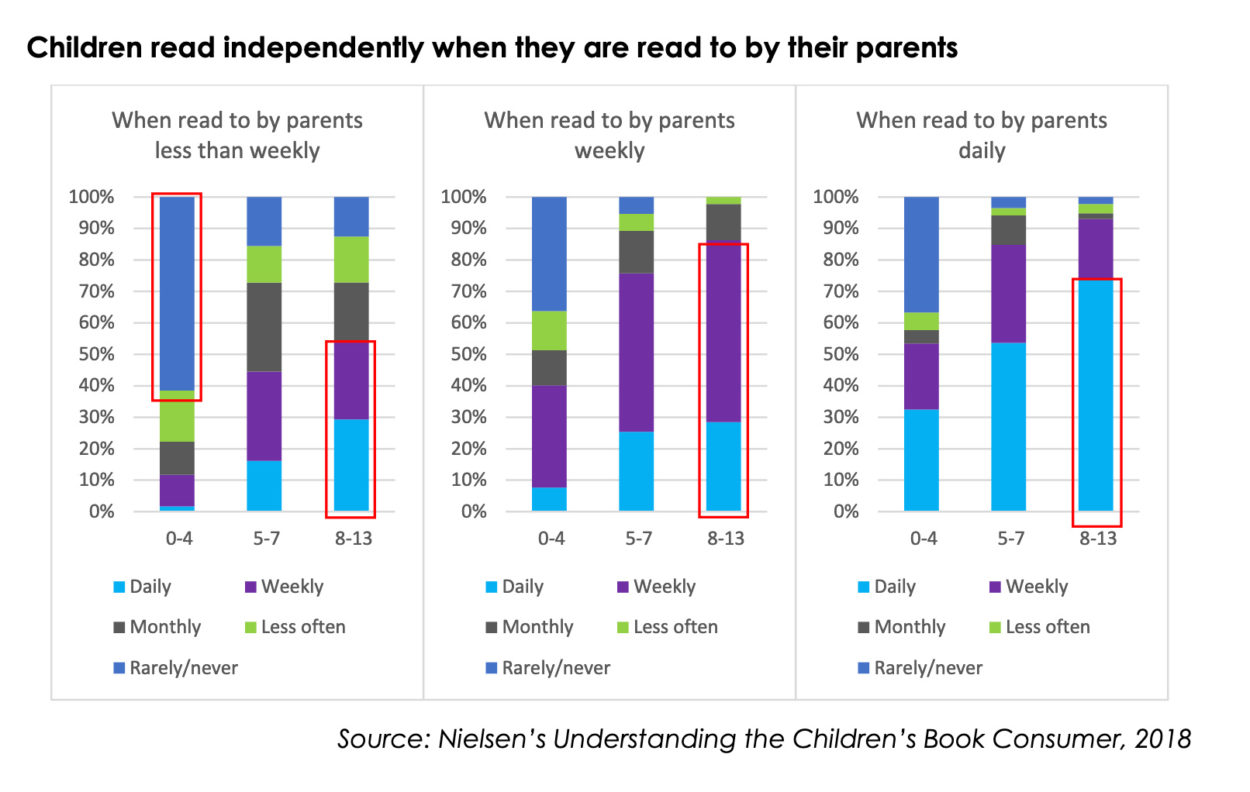It’s International Literacy Day today, and I’d like to talk about fostering a love of reading.
Recent research by Egmont shows that reading for pleasure has huge benefits for children, and the best way to encourage them to do that is for parents to read aloud to their children.
(Thanks to The Author magazine for alerting me to the Egmont study.)
The Benefits of Reading for Pleasure
Overall, reading for pleasure is declining among kids in Britain, crowded out by other forms of entertainment.

But reading has massive benefits, such as:
- better vocabulary and spelling
- higher overall academic achievement
- better resilience
- more happiness
- more empathy
- better communication skills
There’s a lot of emphasis on reading at school, but the danger is that it becomes just a chore, something to be done because you have to. Choosing to read for pleasure is a very different thing.
Why Read to Your Child, When They Already Know How to Read?
Interestingly, the research shows also that it’s worth continuing to read to your child, even when they’re capable of reading independently.
Parents are often keen for their child to read alone, the study says, because it shows development, whereas reading to an older child is seen as babyish. But “they are under the misapprehension that if their child can read, they will choose to read for pleasure.”
It’s an important point, I think. Personally, I enjoyed reading on my own from an early age, and I’m sure many children are the same. But what about all the kids who don’t naturally take to reading? Just being able to do it doesn’t mean that they’ll choose to do it, especially with smartphones and tablets and smartwatches and other gadgets competing for their time and attention.
For kids who don’t naturally start reading on their own, having their parents read to them can have a huge impact:

There’s also a crucial emotional component:
“When reading to a child, the implicit message is ‘You matter enough for me to give you my time’. Children feel loved, secure and a deep sense of well-being when they are read to.”
It’s worth noting that this research is done by a children’s book publisher, so they have an economic stake in this debate. But when you read the detail of the research, it’s hard to argue with the conclusions—especially when you set it alongside other studies they’ve done like Stories and Choices, in which providing books and magazines to a school and having teachers read aloud to children every day had startling effects on the kids’ enthusiasm for reading.
Print Books Are Better Than Ebooks
Earlier research from 2014 also shows that both parents and children prefer physical books to ebooks when reading together. Although children are adept with digital devices and like to use them when alone, paper books work better for joint parent-child time.
The study lays out a number of interesting reasons for this, from the way the books themselves can become familiar, treasured objects to things like the child being able to follow along on the page without accidentally turning to a new page. It’s also a welcome break from all that screen time.
Pass on the Love of Reading
A love of reading has had a huge impact on my own life. It has enabled to me pursue a career as a writer (which has also allowed me to fulfil my lifelong dream of permanent travel). More importantly, it has trained me to see the world through other people’s eyes, to empathise with people who appear to be very different. In today’s world, that’s the most important skill of all, I think.
I’m sure that if you’re reading this blog, you probably love reading too. So why not pass that on to the next generation by setting aside time to read to them, even when they’re old enough to read themselves? And while you’re at it, be aware of who’s being represented in those stories too.



